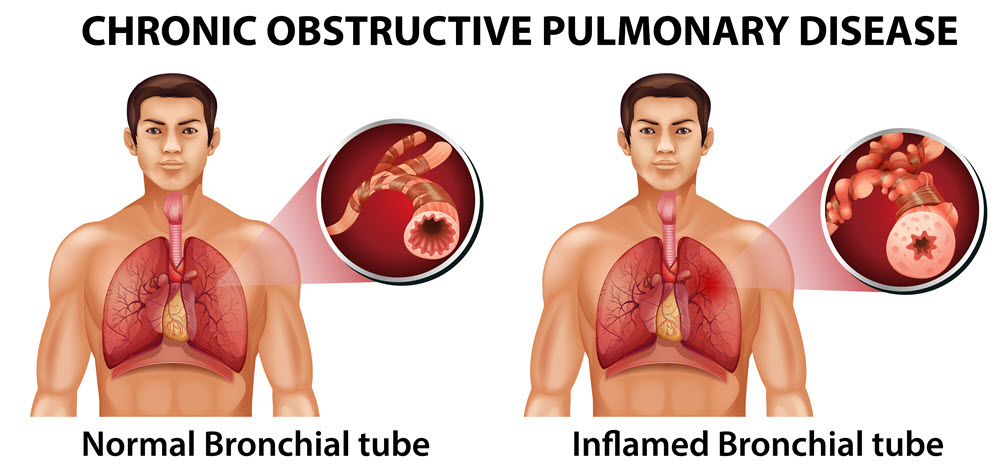Allergies & Immunology
Chronic Obstructive Pulmonary Disease (COPD): What are its Symptoms, Causes, and Treatment?
By S.I. (staff writer) , published on January 12, 2021

Medicine Telehealth Health COPD lungs
What is COPD?
Chronic obstructive pulmonary disease (COPD) is an inflammatory condition characterized by obstruction of airways leading to decreased air conduction through the lungs [1]. This leads to breathlessness and cough. It is a progressive disorder, worsening with time. COPD is manifested in 2 forms:
- Emphysema, which is the destruction of the alveolar sacs, interfering with outward airflow [2].
- Chronic bronchitis is characterized by narrowing of the airways due to inflammation. Mucus build up further reduces the airflow.
What causes COPD?
Multiple reasons can lead to this disease, smoking being the commonest of all [3]. Following are some other major reasons for COPD:
- Chronic exposure to irritant substances such as grain dust, silica, welding fumes, coal dust, and cadmium fumes.
- Long-term exposure to air pollution can increase the risk of developing COPD.
- Genetics are important in determining whether you are at an increased risk of developing COPD or not. If you have close relative suffering from this disease, you are more likely to suffer from it yourself.
- The chemicals in tobacco smoke irritate the respiratory mucosa leading to COPD.
What are the Symptoms of COPD?
COPD makes breathing difficult. It is a progressive disease starting from mild symptoms such as coughing and intermittent shortness of breath. Eventually, the symptoms worsen and become constant [4]. Symptoms of COPD are divided into early and late stages, as described below:
- Early symptoms:
- Mild and recurring coughing
- Shortness of breath after physical activity
- Frequent need to clear your throat, especially in the morning
- Late symptoms:
- Shortness of breath even after a little physical activity such as climbing the stairs.
- Wheezing
- Chronic cough
- Frequent infection of chest
- Tightness of chest
- Cold and flu
- Fatigue
- Weight loss
- Swelling of feet and ankles
What are the Treatment Options Available for COPD?
There is no complete cure available for COPD at the moment. However, some preventive measures and medicines can slow down the progression of this disease [5]. Following are some commonly available options:
- Quit smoking: if you are suffering from COPD, quit smoking at once. It is the leading cause of this disease. You cannot reverse the damage that tobacco smoke has caused, the least you can do is prevent further damage by quitting smoking.
- Inhalers: it is a device to deliver medicine directly into your lungs. A number of different drugs are given through inhalers in COPD. Bronchodilator and steroid inhalers are most commonly used. The advantage of using these is the quick delivery of the drug into the lungs.
- Theophylline tablets: it probably works by reducing inflammation of the airways leading to improved air conduction through your lungs.
- Pulmonary rehabilitation: it is a specialized program of exercise and to educate people regarding lung problems such as asthma and COPD. It helps you improve your pulmonary health.
References:
- https://www.copdfoundation.org/What-is-COPD/Understanding-COPD/What-Causes-COPD.aspx
- https://www.nhs.uk/conditions/chronic-obstructive-pulmonary-disease-copd/
- https://www.nhs.uk/conditions/chronic-obstructive-pulmonary-disease-copd/causes/
- https://www.ncbi.nlm.nih.gov/books/NBK559281/
- https://www.nhs.uk/conditions/chronic-obstructive-pulmonary-disease-copd/treatment/
Find articles related to: Medicine Telehealth Health COPD lungs
More articles about Allergies & Immunology
Back to the Health Tips Index




